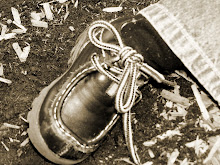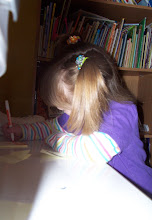Tuesday, June 10, 2008
They Get It
My kids get it. I could not be any prouder of these children and how much they have accomplished, and what I am most proud of can not be measured on an IEP goal or on a developmental checklist. What makes me want to give them each a gold medal and set them before the world as true heroes is the fact that they have come together, a group of children that includes three children who are typically developing, one child with an emotional disturbance and language delay, two children with severe disabilities, three children with autism, one child who has mild developmental delays but is learning English as a second language and one child who had developmental delays as a result of medical issues but who (even with his trach and g-tube) is kicking butt and catching up rapidly (also learning English as a second language), and formed a class that takes care of each other. My child with significant autism who has just begun to say a few words has become the protector of is classmates and is the first to come investigate what is wrong when someone is crying. He offers consolation in his own way, with a gentle touch, a smile, and the offer of a cherished toy. One of my inclusion peers has taken another child with autism into her care and is her guardian, making sure that she is not only safe but included in all activities. She very patiently and lovingly plays with her classmate, bringing her into her activities and ignoring her missing social skills, instead filling in for whatever is missing and thus providing a scaffold naturally so they ca play together. Today another inclusion peer requested a toy and when given it, my child who has behavioral issues tried to fight him for it. I redirected him and set a time limit for turns with the toy. When his turn was up, the child was allowed to give the desired toy to any of his peers who were sharing it with him (it was the key to the mailbox they were playing with that was so hotly contested). Instead of being angry at his classmate who had just 5 minutes earlier tried to hurt him, he kindly handed it to his peer who had tried to fight him and told him "its your turn now, X. thank you for waiting". He wasn't just echoing my words either, he meant them. I can give a hundred more examples - how my children talk about how some day the two children in my class who use wheelchairs will walk with them on the playground when their muscles get stronger and learn how to work together, how they compete to see who gets to help push the wheelchairs or hold a friend's hand to help them down the hallway, how they speak up for one another and are intuitively aware of each other's strengths and weaknesses (when playing chase they will often slow down so that the children who are slower can keep up without being asked to do so, they will choose to play games everyone can play together). We are by no means a perfect class - my little ones can fight like scrappers, can argue, can take advantage of each other, can have awful days when I am tempted to set them outside with a sign "free to a good home". But we are something special, and not special in the way that it is used in education. We have created something together, and I mean that the kids are just as responsible as the adults - we did it together, where everyone is a valued and treasured part of the community and ability level is meaningless. It is fact in our classroom that everyone has things they are good at, and everyone has things they need help doing and that we simply help each other when we need help. I did not realize how deeply this belief went until my principal made a comment when displaying my class to her supervisor that "they all have special needs. well, not all of them. two of them are normal." I was shocked because I don't see normal/not normal and I am willing to bet every dollar I have ever made that none of the children in my class do either. We see friends, we see classmates, we see the children we know and share our days with but we do not see disabilities or differences or abnormalities or normalities or atypicalities or typicalities. At the ages of 3 and 4 my kids get it completely, deeply, and without question. They accept one another as individuals, they support one another playing off of each other's strengths and weaknesses, and they love their friends for who they are not for what they are. So where do we lose it? If we can get it so easily at 3, why is it so hard to get it as adults? Where does it go? How do I help get it back? And how do I tell my little ones just how brilliant, amazing, and extraordinary they are for their insight and maturity at such an age? Because a sticker, a paper award, a trinket just does not seem like enough to document what they have accomplished. They have proven countless adults wrong, they have proven that inclusion is absolutely worth it, they have proven that children are just children, and they have done it all without even knowing what they are doing. Sometimes the educator becomes the student.
Subscribe to:
Post Comments (Atom)






2 comments:
This post is just amazing Auburn Rose -- you are the teacher that we hope and pray for when we think of what we long for in a teacher for our precious children. Your last paragraph took my breath away with it's justice -- it's rightness. It feels so very very good to know that there are teachers like you in our schools. Keep up the beautiful, beautiful work.
~Michelle @ In The Life of A Child
I second what Michelle @ In The Life of a Child- just commented--
If we could only just clone you and that way make you availible to all!
Life at home with these kids is what we know, it is nice to see/hear that there are teachers who see the promise of GOOD in them while away from us!
Sharing this post with the parents would be a welcome gift, I think!
Post a Comment